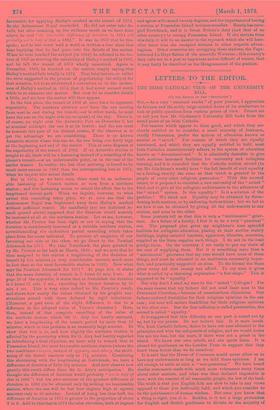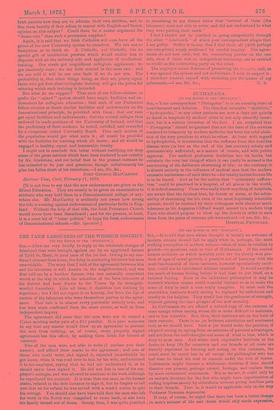LETTERS TO THE EDITOR.
TELE IRISH CATHOLIC VIEW OF THE UNIVERSITY BILL.
[TO THE EDITOR OF THE "SPECTATOR."]
Sirs—As a very "constant reader" of your journal, I appreciate- its fairness and the really large-minded desire of its conductors to look at public questions from various points of view. Permit me- to tell you how Mr. Gladstone's University Bill looks from the- stand-point of an Irish Catholic.
For reasons which appear to them good, and which they are clearly entitled so to consider, a small minority of Irishmen, chiefly Protestants, prefer the system of education known as- secular or "mixed." For reasons of which they are equally convinced, and which they are equally entitled to hold, most Irish Catholics conscientiously adhere to the system of education known as "denominational." It is admittedly desirable to give- both sections increased facilities for university and collegiate- training, and it is conceded that the Catholic section should (to- use Mr. Gladstone's words) have "the full benefit of civil equality on a footing exactly the same as that which is granted to the people of every other religious persuasion." With this avowed intent, it is proposed to establish a new university of the" mixed " kind, and to give all the collegiate endowments to the adherents of the " mixed " system. Is this equality ? Is it a solution of the problem ? We think not. Equality may be obtained by disen- dowing both sections, or by endowing both sections ; but we fail to- see how it can be obtained by giving all the endowments to one section, and none to the other.
Some journals tell us that this is only a "sentimental "griev- ance. As a father of a family, I feel it to be a very "practical" one. The proposed plan gives my neighbour's sons splendid facilities for collegiate education, placing at their service stately buildings, highly-salaried teachers, apparatus, libraries, museums,_ supplied as the State supplies such things. I do not in the least grudge them. On the contrary, I am ready to pay my share of the cost of supplying them. But it is something more than a " sentimental " grievance that my sons should have none of these- things, and must be educated in an institution necessarily imper- fect, and practically supported on alms. To the former the State- gives every aid that money can afford. To my sons it gives what is called by a charming euphemism "a free scope." This is- supposed to be "equality."
But why don't I send my sons to the " mixed " Colleges ? For the same reason that my fathers did not send their sons to the- Protestant Churches,—because of conscientious objections. Our fathers endured disabilities for their religious opinions in the one case ; our sons will endure disabilities for their religious opinions in the other case. But the first infliction is called persecution, the- second is called "equality."
It is suggested that this difficulty on our part is raised not by us, but by our priests. Do not believe this. It is mere insult We, Irish Catholic fathers, desire to have our sons educated in the- principles and with the safeguards of religion, and we would desire this not the less, but the more, if there were not a priest in the- island. We know our own minds, and can speak them. It is absurd for gentlemen on the London Press to suppose that they know them better than we do ourselves.
It is said that the House of Commons would never allow us to have any endowments so long as we hold those opinions. I am old enough to smile at such a " non-possumus." We have heard similar statements made with much more vehemence many times about other matters, and what was then declared impossible is now, with the consent of all reasonable people, the law of the land. The truth is that you English folk are slow to take in any views- opposed to those you habitually hold, and which you consider to be the quintessence of human wisdom. But once you know that a thing is right, you do it. Besides, is it not a large pretension for English and Scotch gentlemen to dictate to the majority of Irish parents how they are to educate their own children, and to fine them heavily if they refuse to concur with English and Scotch .opinien on this subject? Could there be a neater argument for 4' home-rule" than such a pretension supplies ?
Again, it is said that we Irish Catholics will soon have all the prizes of the new University system to ourselves. We are not so bumptious as to think so. A Catholic, quit Catholic, has no .special gift of intellectual prowess which would enable him to dispense with all the ordinary aids and appliances of intellectual *raining. Our rivals get magnificent collegiate appliances ; we get absolutely none ; we are both started in the same race ; and we are told it will be our own fault if we do not win. The probability is, that other things being, as they are, pretty equal, those who get first-class collegiate training will get the prizes for winning which such training is intended.
But what do we suggest ? That such of our fellow-citizens as prefer the " mixed "' system should have ample facilities and en- dowments for collegiate education ; that such of our Protestant fellow-citizens as desire similar facilities and endowments on the .denominational principle, be provided with them ; that our sons get equal facilities and endowments; that the several colleges thus endowed be made portions of the University of Ireland, and that the proficiency of their students be tested, certified, and rewarded by a competent mixed University Board. Thus each section of the population would get what suits it ; all would be provided with the facilities for learning which all desire ; and all would be engaged in healthy, equal, and honourable rivalry.
I ought not to conclude this letter without testifying our deep sense of the great services which have been rendered to our country by Mr. Gladstone, and our belief that in the present instance he has intended to be just and generous, though unfortunately his plan has fallen short of his intentions.—I am, Sir, &c., It is not true to say that the new endowments are given to the Mixed Education. They are mostly to be given on examination to students who may hold them in a Denominational college, or any- where else. Mr. MacCarthy is evidently not aware how strong the tide is running against endowments of particular faiths in Eng- land. Without the help of that tide, the Irish Protestant Church would never have been disendowed ; and for the present, at least, it is a mere bit of "lunar politics" to hope for fresh endowments -of Denominational schools.—En. Spectator.]



































 Previous page
Previous page